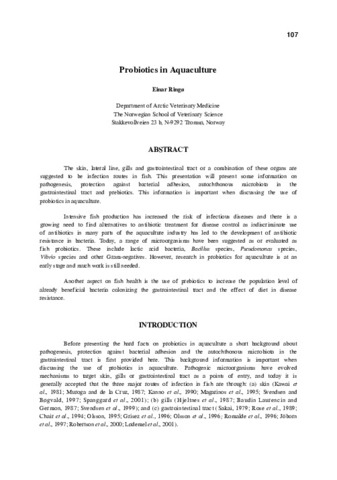Probiotics in aquaculture
- Global styles
- MLA
- Vancouver
- Elsevier - Harvard
- APA
- Help
Share
Abstract
The skin, lateral line, gills and gastrointestinal tract or a combination of these organs are suggested to be infection routes in fish. This presentation will present some information on pathogenesis, protection against bacterial adhesion, autochthonous microbiota in the gastrointestinal tract and prebiotics. This information is important when discussing the use of probiotics in aquaculture.
Intensive fish production has increased the risk of infectious diseases and there is a growing need to find alternatives to antibiotic treatment for disease control as indiscriminate use of antibiotics in many parts of the aquaculture industry has led to the development of antibiotic resistance in bacteria. Today, a range of microorganisms have been suggested as or evaluated as fish probiotics. These include lactic acid bacteria, Bacillus species, Pseudomonas species, Vibrio species and other Gram-negatives. However, research in probiotics for aquaculture is at an early stage and much work is still needed.
Another aspect on fish health is the use of prebiotics to increase the population level of already beneficial bacteria colonizing the gastrointestinal tract and the effect of diet in disease resistance.
Suggested Citation
Ringø, E. (2002). Probiotics in aquaculture. In Y. Inui & E. R. Cruz-Lacierda (Eds.), Disease Control in Fish and Shrimp Aquaculture in Southeast Asia - Diagnosis and Husbandry Techniques: Proceedings of the SEAFDEC-OIE Seminar-Workshop on Disease Control in Fish and Shrimp Aquaculture in Southeast Asia - Diagnosis and Husbandry Techniques, 4-6 December 2001, Iloilo City, Philippines (pp. 107-135). Tigbauan, Iloilo, Philippines: SEAFDEC Aquaculture Department.
Type
Conference paperISBN
9718511601



